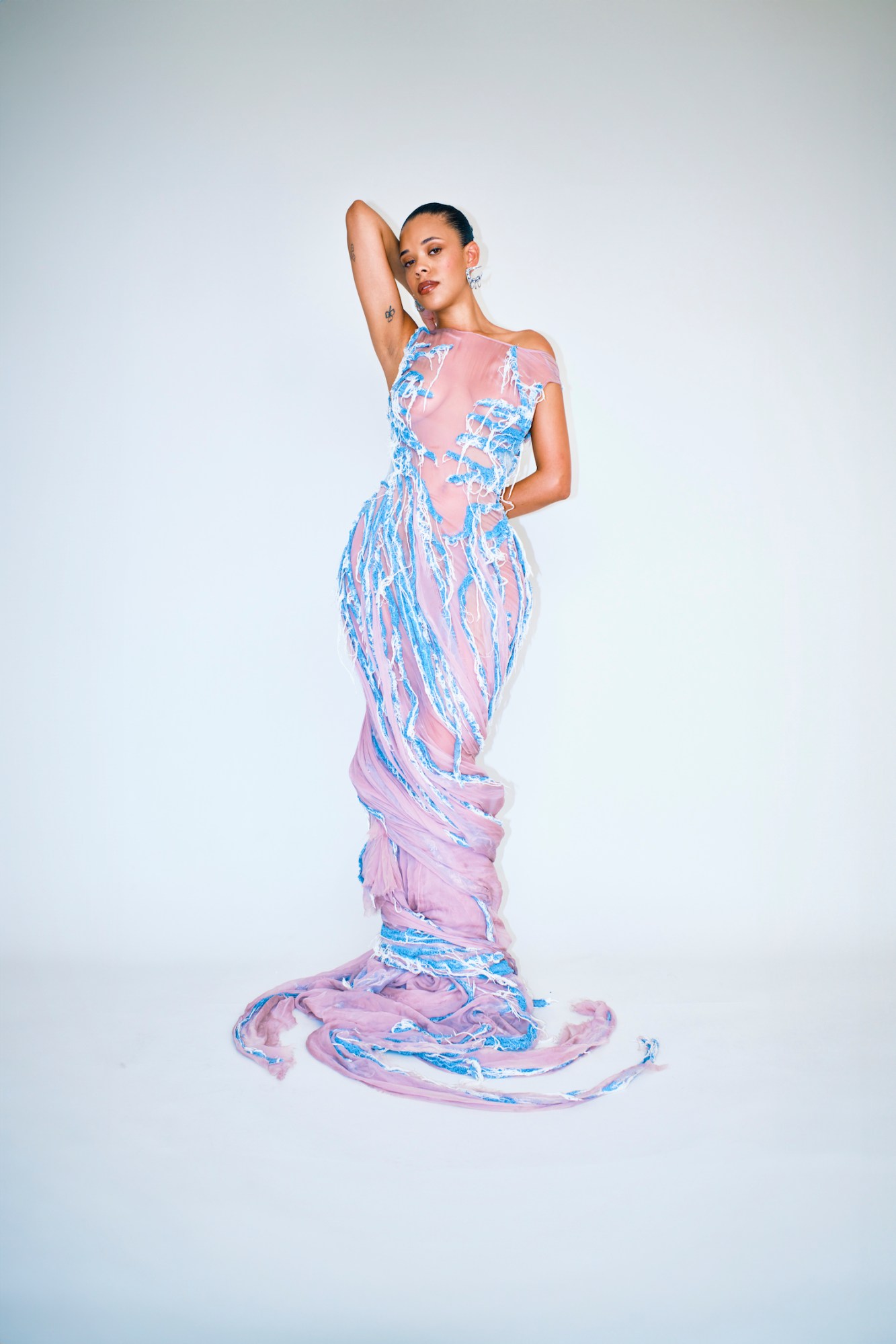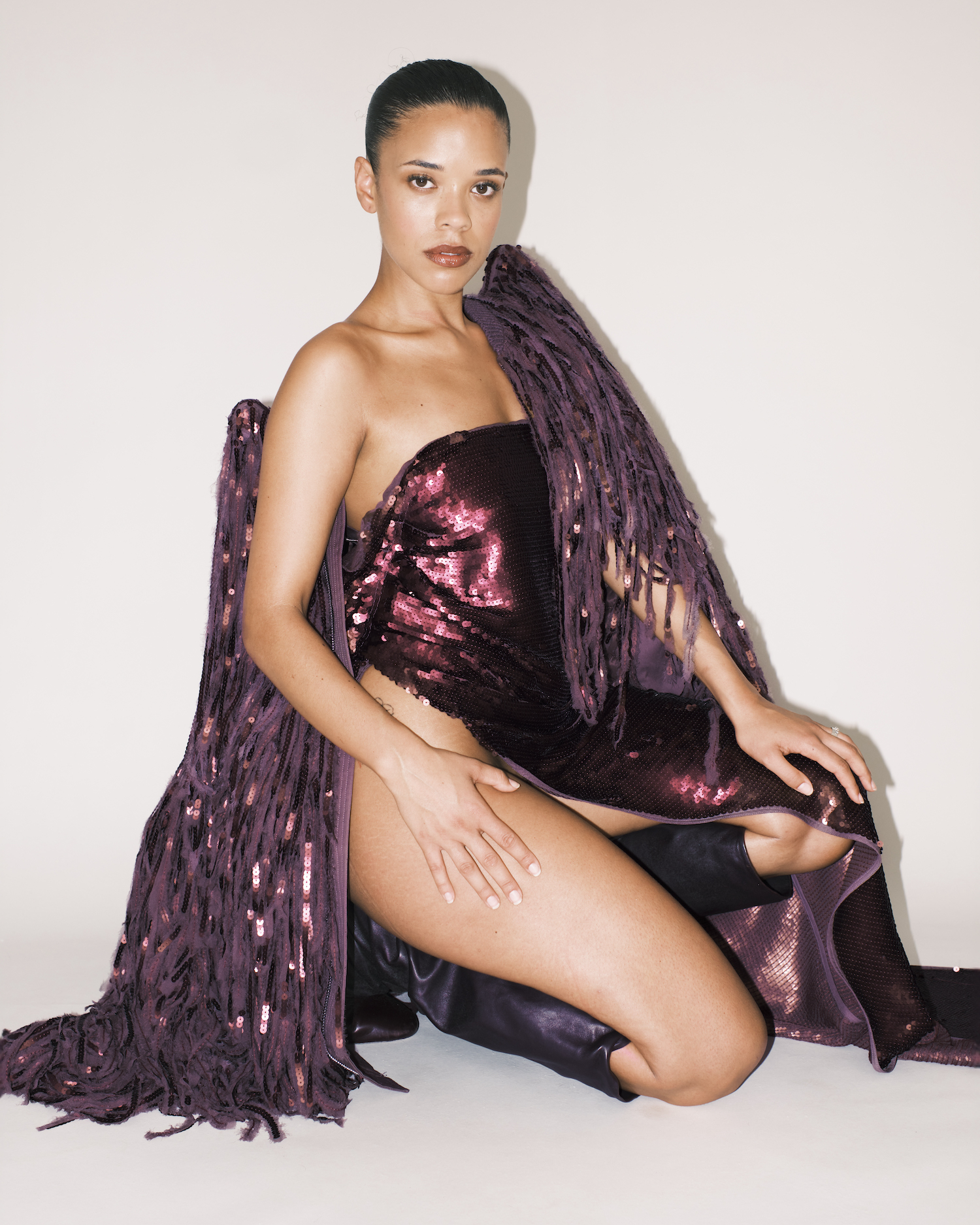Since the beginning of her career, Cassia O’Reilly’s music has radiated confidence and self-possession. Mt. Pleasant, her 2021 debut – and her first record released under the moniker Cosha, a phonetic spelling of her first name – was sleek and mellifluous, Cosha’s amber-toned voice contorting itself into unusual shapes as she sang about sex and romance with a clear gaze and a wry smile.
That resolute sense of self might stem from a life and career that’s been defined by multiplicity: Cosha was born in midwest USA and raised in County Wicklow, Ireland; she’s a longtime collaborator of Mura Masa and has worked with Chic, Shygirl and Charli XCX. Murmurs, her forthcoming EP, is a softer and warmer record than Mt. Pleasant, but it’s no less self-assured. But it was a journey to get there. “I thought that after Mt. Pleasant, I would kind of be staying on the love-laced path that I was going down,” says Cosha, Zooming from her bedroom in Dalston, her rich voice worn rough by a cold. “And then some things happened.”
Shortly after the release of Mt. Pleasant, Cosha went through two catastrophic losses: first, she and her partner of seven years – who she lived with, and who was also her closest musical collaborator – broke up. Then, a short while later, Cosha’s manager, who she had only been working with for a few months, decided she was quitting management, leaving Cosha to fend for herself, in an industry that’s famously unkind to self-managed artists. “There were just two big shocks, two very life-changing things, that happened within the same year,” she says. “I didn’t even think about music for a while, I was just a little bit broken – I couldn’t face it.”
After Cosha and her manager parted ways, the path forward that had been laid out – including a new deal with a label and publisher, after releasing Mt. Pleasant independently – melted away in an instant. Caught in the maelstrom of a quarter-life crisis, and bereft of a safety net, music became hard to think about.
These were taxing circumstances for Cosha, to say the least, but she’s come to see them as a crucial turning point — and not just in her career. She’d reached a critical fork in life’s path: down one route, an existence marked by comfort, familiarity and, ultimately, complacency — by a decision to simply accept things as they were; down another, a total enigma — a fear-framed world of questions that, despite a sense of trepidation, she felt compelled to do all she could to solve. “This is so corny, but I was just like, if I was reading the book of my life, and I got to this point in the book, I’d be like, ‘Oh shit, what’s next? What’s she gonna do?’ I wanted to be able to read this book back and be like, ‘Yeah, she made the most of it, she made a good comeback.’”
Fuelled by renewed senses of fearlessness, independence and drive, she slowly found herself back on her feet, gathering pace towards the project that bloomed into Murmurs. From negotiating a new distribution deal to hustling to stage shows to fund the project, curating a network of collaborators to creative directing and producing the EPs visuals, she set about orchestrating a comeback that, for most artists, would have taken sprawling teams— and correlating budgets — to pull off.

She began working on the demos that would become Murmurs; after sending them to a friend in LA, he invited her to come and work on them in his studio, and she decamped to the city for a while, hiring convertibles and exploring new romance in the California sprawl. “Sun Back”, a gorgeous keystone for the EP, describes the feeling Cosha had after going to a jam session she was invited to by a friend, and the subsequent realisation that she had the talent and drive to hold her own against all the virtuosos she was playing with. “I felt really good,” she says. “There was a moment where I was just really proud of myself for getting to that point, where I was basically a person I had never been before.”
That feeling radiates across the rest of the EP – the idea that, sometimes, pain can yield strength and joy. On the sensual “Fire Me Up”, she sings about being “finally able to let down my guard”; the 2000s R&B throwback “Free” is an ode to feeling “free to do whatever I want.” Murmurs is occasionally wounded, but often triumphant in this vein, as Cosha was that evening in Los Angeles. “Sometimes you kind of imagine what your future self is gonna look like, and I realised that I had imagined the person I was at that moment,” she says. “I felt really confident – I was proud of myself to have stepped through and powered on.”


Credits
Photography Viðar Logi
Styling Hamish Wirgman
Hair Manwigs
Make Up Merveille
Styling Assistance Elliott Bulmanoluwalani Jegede
